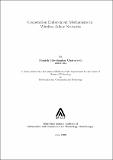Please use this identifier to cite or link to this item:
http://drsr.daiict.ac.in//handle/123456789/259Full metadata record
| DC Field | Value | Language |
|---|---|---|
| dc.contributor.advisor | Srivastava, Sanjay | |
| dc.contributor.author | Chaturvedi, Manish Shivshankar | |
| dc.date.accessioned | 2017-06-10T14:37:59Z | |
| dc.date.available | 2017-06-10T14:37:59Z | |
| dc.date.issued | 2009 | |
| dc.identifier.citation | Chaturvedi, Manish Shivshankar (2009). Cooperation enforcement mechanisms in wireless adhoc networks. Dhirubhai Ambani Institute of Information and Communication Technology, viii, 92 p. (Acc.No: T00222) | |
| dc.identifier.uri | http://drsr.daiict.ac.in/handle/123456789/259 | |
| dc.description.abstract | Wireless adhoc networks are autonomous, infrastrutureless networks where there are no dedicated routers or base stations and nodes are expected to cooperate in Wireless performing routing duties to keep network connected. Cooperation can be assumed if all nodes belong to single authority (e.g. military service or disaster management). But in applications where nodes do not belong to single authority and have limited resources (energy of battery driven devices), like pervasive computing or ubiquitous computing environment, one can not deny possibility of node selfishness. Also as there is no central authority to control node behavior, one can not deny possibility of node maliciousness. Many cooperation enforcement schemes are proposed in literature, and every scheme is shown to perform better under its own set of assumptions. These assumptions are different for different schemes. So, we aim at defining common set of assumptions and comparing selected schemes on this common ground with respect to packet delivery ratio, energy consumption, routing and other control overhead. We find that with the traffic scenario where nodes do not need services of one another at the same time, the cooperation schemes are not effective in dealing with node selfish ness. We also find that, while dealing with malicious nodes, all cooperation schemes perform better than Dynamic Source Routing(DSR) protocol in improving packet de- livery ratio(PDR), but this improvement comes at the cost of significant increase in routing control packets overhead and energy consumption of cooperation enforcement schemes is higher than that of DSR. Also they fail in punishing misbehaving nodes and the PDR of malicious nodes is comparable to that of good nodes. | |
| dc.publisher | Dhirubhai Ambani Institute of Information and Communication Technology | |
| dc.subject | Wireless ad-hoc networks | |
| dc.subject | Routing | |
| dc.subject | Computer network management | |
| dc.subject | Computer network architectures | |
| dc.subject | Quality control | |
| dc.subject | Wireless communication systems | |
| dc.subject | Ad-hoc networks | |
| dc.subject | Access control | |
| dc.subject | Routers | |
| dc.subject | Computer network protocols | |
| dc.classification.ddc | 621.384 CHA | |
| dc.title | Cooperation enforcement mechanisms in wireless adhoc networks | |
| dc.type | Dissertation | |
| dc.degree | M. Tech | |
| dc.student.id | 200711034 | |
| dc.accession.number | T00222 | |
| Appears in Collections: | M Tech Dissertations | |
Files in This Item:
| File | Description | Size | Format | |
|---|---|---|---|---|
| 200711034.pdf Restricted Access | 730.98 kB | Adobe PDF |  View/Open Request a copy |
Items in DSpace are protected by copyright, with all rights reserved, unless otherwise indicated.
